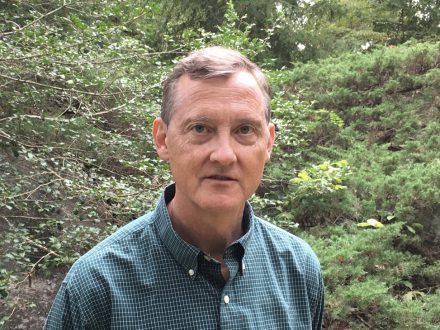King, a physician and renewable energy entrepreneur, is the director of development for The Institute of Convergent Science at the University of North Carolina at Chapel Hill.
With his current work with The Institute for Convergent Science at the University of North Carolina at Chapel Hill, Dr. Caleb King is focused on creating collaboration across campus and across disciplines that could lead to the creation of new technologies and ideas promising broad societal impact.

It’s a position that comes naturally to King, a Chapel Hill native whose academic, professional and humanitarian pursuits have pulled together expertise and inspiration from a range of interests and passions. A Harvard-educated physician, King also earned a doctorate in civil and environmental engineering from the Massachusetts Institute of Technology while pursuing his medical degree. An accomplished pediatric gastroenterologist, he and his wife picked up their family to move to Rwanda in the wake of that country’s genocide to revive a rural hospital. While in Rwanda, King dusted off his engineering training to build out a hydropower system that powers the hospital and surrounding communities and continues to thrive as a business venture.
And on Thursday, April 6, King will visit Elon to deliver the James P. Elder Lecture in Whitley Auditorium at 6:30 p.m. He’ll be sharing about how to create a better pathway to move research and innovative ideas to commercialization where they can have broad and deep societal impacts.
“Convergent science brings people together from multiple departments and fields and disciplines by focusing on a problem which has important impacts, asking how we bring together the contributions of many viewpoints and perspectives to focus on that problem, and find solutions together,” King said.
King points to the COVID-19 pandemic as a complex public and global problem that required a variety of disciplines with varying areas of expertise to come together to mitigate the pandemic’s impacts. “It was not just a matter of someone developing a vaccine and treatments,” King said. “It was about how do make all these things happen and get mobilized? And how do you communicate to people, which actually wasn’t done that well. How do you consider what’s important and what’s not important?
“It turns out there are lots of different ways of looking at a problem — the natural science of the problem, the social science behind it, communication regarding the problem, and the most basic level, the human side, how people actually perceive and experience the problem, and that’s true of most problems,” he said.
On a personal level, King’s experience across 16 years of living in Rwanda demonstrates the power to positively impact society by bringing together different areas of expertise to address complex problems. King was perfectly positioned to take such an approach to problem-solving given the breadth of his academic pursuits.
After graduating with a chemistry degree from UNC, King spent a year in Oxford, England as a Rhodes Scholar where he was able to dive into his interest in the economics of developing countries, with time spent in Africa and a developing interest in global health.
While pursuing his medical degree, he decided to tackle a doctorate in engineering from M.I.T. where he explored his interest in river basin planning and modeling. His studies explored the public health implications from the development of hydropower systems that altered the flow of river basins. That alteration could impact the amount of standing water, which could in turn increase the impact of tropical diseases such as malaria.
“Life went on, and I began forgetting about what I could do in the field of engineering, but hoped that one day what I worked on would prove valuable,” King said.
As young doctors, King and his wife began considering a move abroad to find new ways they could leverage their medical expertise. During a family trip to Pawley’s Island, they visited a local church one Sunday morning, and heard from an Anglican bishop from Rwanda named John Rucyahana. It turned out they had a common friend in a former college chaplain at UNC, and their conversation planted the seeds for the Kings to move to Rwanda.
“When we got to Rwanda, we found that people had a lot of needs other than their health,” King said. “They lacked housing, roads, basic services like water and electricity to their homes, wanted education for their children, yearned for safety, security and hope for the future; you can’t just look at health in isolation.”
As he and his wife worked to revive a rural hospital, King’s focus turned toward determining a cost-effective way to bring power to the hospital and in turn the community. The Director of the national electricity utility, overwhelmed by the recovering country’s growing needs for energy, suggested that King use the rivers and streams that ran down the hills near their community to make electricity locally. He would tap into his training as a civil engineer to design a “run-of-river” hydropower system that powered not just the hospital, but the homes that surrounded it.
“If I hadn’t pursued that degree, I wouldn’t have thought I could do it. It turns out education is actually useful,” King said with a laugh.
King will talk more about his experiences and his vision for convergent science at the Elder Lecture. The James P. Elder Lecture is an endowed lecture series devoted to the exploration of critical scholarship and its impact on the public forum. When Elder served on the history faculty of Elon (1963-1973), he was an advisor to the Liberal Arts Forum, which he founded as an undergraduate. Thirty years after he left Elon for the Folger Library in Washington, D.C., a group of Forum alumni established an endowed lectureship in Elder’s honor. More than 150 former students and friends have contributed to the Elder Lectureship in tribute to Elder’s example of faculty-student engagement.


